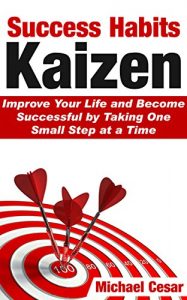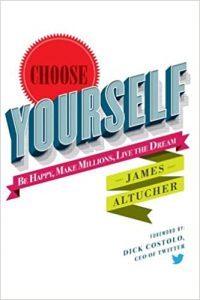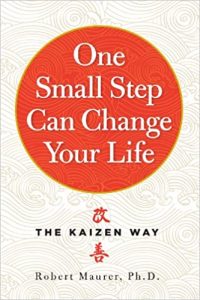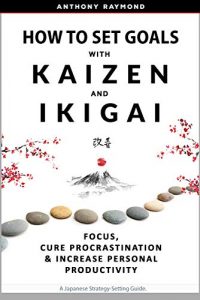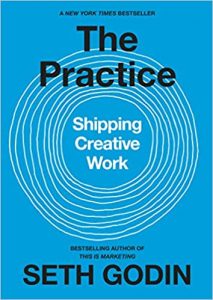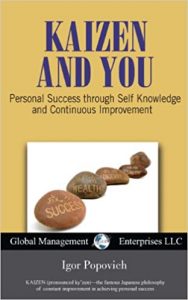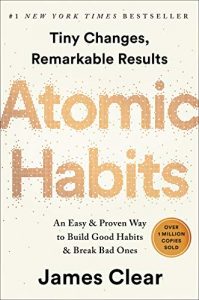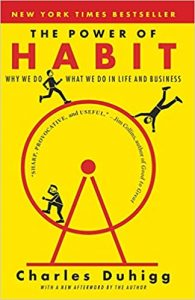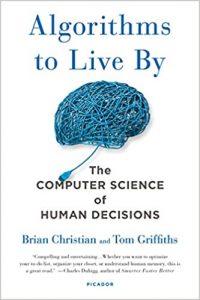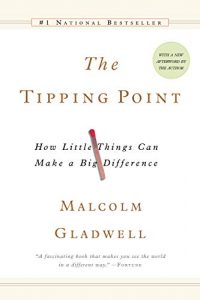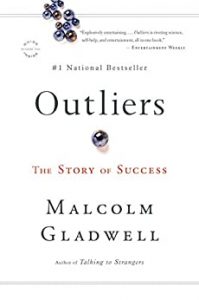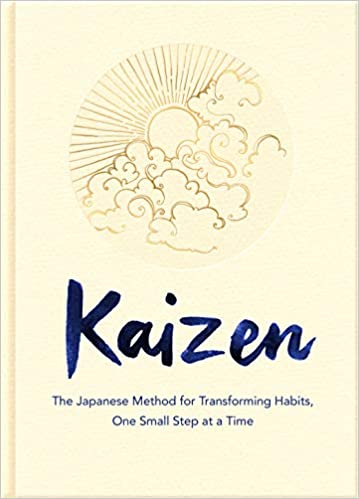These are all the quotes I could find about kaizen and continuous self-improvement. They are mostly related to personal development and kaizen, but there are some about kaizen in the business world too.
Lots are missing from some of my favourite books about kaizen for self-growth, which I will be adding as soon as possible.
In the spirit of kaizen, this post will be continuously updated with more kaizen quotes as I find them and improved with images and sharable stuff as and when I can. I will also attempt to verify who they are attributed to as much as possible.
My Favourite Quotes About Kaizen and Continuous Improvement
“Patience is a competitive advantage. In most fields, you can find success if you are simply willing to do the reasonable thing longer than most people.”
— James Clear
“Average ones compete with others. Great ones compete with themselves.”
— Vadim Kotelnikov
“We cannot become what we want to be by remaining what we are.”
— Max DePree
“A pessimist sees the difficulty in every opportunity; an optimist sees the opportunity in every difficulty.”
— Sir Winston Churchill
“I’m always trying to get better. There’s always room for improvement.”
— Cain Velasquez
“Kaizen is like a hotbed that nurtures small and ongoing changes, while innovation is like magma that appears in abrupt eruptions from time to time.”
— Masaaki Imai
“Perfection is not attainable, but if we chase perfection, we can catch excellence.”
— Vince Lombardi
“Knowledge has to be improved, challenged, and increased constantly, or it vanishes.”
— Peter Drucker
“There are no big problems. There are just a lot of little problems.”
— Henry Ford
“Persistence, perseverance, and continuous improvement are the ingredients for forming a successful person.”
— Debasish Mridha
“The distance between number one and number two is always a constant. If you want to improve the organization, you have to improve yourself and the organization gets pulled up with you.”
— Indra Nooyi
“We are what we repeatedly do. Excellence, then, is not an act, but habit.”
— William Durant
“Failure is only the opportunity to begin again more intelligently.”
— Henry Ford
“Without change, there is no innovation, creativity, or incentive for improvement. Those who initiate change have a better opportunity to manage the change that is inevitable.”
— William Pollard
“The largest room in the world is the room for improvement.”
— Author Unknown
“A relentless barrage of “why’s” is the best way to prepare your mind to pierce the clouded veil of thinking caused by the status quo.
Use it often.”
— Shigeo Shingo
“Fall seven times. Stand up eight.”
— Japanese Proverb
“The Hacker Way is an approach to building that involves continuous improvement and iteration. Hackers believe that something can always be better and that nothing is ever complete.”
—Mark Zuckerberg
“There’s no limit to the possible expansion of each one of us.”
— Charles Schwab.
“The message of the Kaizen strategy is that not a day should go by without some kind of improvement being made somewhere in the company.”
— Masaaki Imai
“Never stop investing. Never stop improving. Never stop doing something new. Make it your goal to be better each and every day, in some small way. Remember the Japanese concept of Kaizen. Small daily improvements eventually result in huge advantages.”
— Bob Parsons
“The most dangerous kind of waste is the waste we do not recognize.”
— Shigeo Shingo
“If you’re not getting better, you’re getting worse.”
— Joe Paterno
“The Kaizen Philosophy assumes that our way of life – be it our working life, our social life, or our home life – deserves to be constantly improved.”
— Masaaki Imai
“Great things are done by a series of small things brought together.”
— Vincent Van Gough
“The secret of getting ahead is getting started. The secret of getting started is breaking your complex overwhelming tasks into small manageable tasks and starting on the first one.”
— Mark Twain
“The man who makes no mistakes does not usually make anything.”
— E.J. Phelps
“Learning is not compulsory; it’s voluntary. Improvement is not compulsory; it’s voluntary. But to survive, we must learn.”
— W. Edwards Deming
“Where there is no Standard there can be no Kaizen.”
—Taiichi Ohno
“Success is the sum of small efforts, repeated day in and day out.”
— Robert Collier
“Kaizen means ongoing improvement involving everybody, without spending much money.”
— Masaaki Imai
“Continuous improvement is not about the things you do well — that’s work. Continuous improvement is about removing the things that get in the way of your work. The headaches, the things that slow you down, that’s what continuous improvement is all about.”
— Bruce Hamilton
“If a company isn’t continuously improving then it is slowly dying.”
— Dave Waters
“He who rejects change is the architect of decay.”
— Harold Wilson
“Small daily improvements over time lead to stunning results.”
— Robin Sharma
“Kaizen and innovation are the two major strategies people use to create change. Where innovation demands shocking and radical reform, all kaizen asks is that you take small, comfortable steps toward improvement.”
— Robert D. Maurer
“Excellent firms don’t believe in excellence, only in constant improvement and constant change.”
— Tom Peters
“You can’t do kaizen just once or twice and expect immediate results. You have to be in it for the long haul.”
— Masaaki Imai
“I don’t worry about maintaining the quality of my life, because every day I work on improving it.”
— Tony Robbins
“There’s no good idea that can’t be improved on.”
— Michael Eisner
“I’m never satisfied with what I do.
I always think I can do it a lot better.”
— Michael Jackson
“The secret of getting ahead is getting started”
— Mark Twain
“Small actions are at the heart of kaizen. By taking steps so tiny that they seem trivial or even laughable, you’ll sail calmly past obstacles that have defeated you before. Slowly – but painlessly! – you’ll cultivate an appetite for continued success and lay down a permanent new route to change.”
— Robert D. Maurer
“It is not necessary to change. Survival is not mandatory.”
— W. Edwards Demin
“I fear not the man who has practiced 10,000 kicks once, but I fear the man who has practiced one kick 10,000 times.”
— Bruce Lee
“Sometimes, the best kaizen is no kaizen at all.”
— Jon Miller
“As you experience success in applying kaizen to clear goals like weight loss or career advancement, remember to hold onto its essence: an optimistic belief in our potential for continuous improvement.”
— Robert D. Maurer
“If you don’t know where you are going, you might wind up someplace else.”
— Yogi Berra
“We conquer by continuing.”
— George Matheson
“The past does not equal the future…unless you live there”.
— Tony Robbins
“I think it’s very important to have a feedback loop, where you’re constantly thinking about what you’ve done and how you could be doing it better.”
— Elon Musk
“Learn continually. There is always one more thing to learn.”
— Steve Jobs
“Something is wrong if workers do not look around each day, find things that are tedious or boring, and then rewrite the procedures. Even last month’s manual should be out of date.”
— Taiichi Ohno
“If you stop learning, you stop creating history and become it.”
— Vadim Kotelnikov
“One key to successful leadership is continuous personal change. Personal change is a reflection of our inner growth and empowerment.”
— Robert E. Quinn
“Success is a process that continues, not a status that you reach. If you are alive, there are lessons to be learned.”
— Denis Waitley
“There are risks and costs to a program of action, but they are far less than the long-range risks and costs of comfortable inaction.”
— John F. Kennedy
“If you’re not getting better, you’re getting worse. ”
— Pat Riley
“No company can afford not to move forward. It may be at the top of the heap today but at the bottom of the heap tomorrow, if it doesn’t.”
— James Cash Penney
“To make the quickest progress, you don’t have to take huge leaps. You just have to take baby steps and keep on taking them. In Japan, they call this approach kaizen, which literally translates as ‘continual improvement.’ Using kaizen, great and lasting success is achieved through small, consistent steps. It turns out that slow and steady is the best way to overcome your resistance to change.”
— Marci Shimoff
“The best way to have a good idea is to have lots of ideas.”
— Linus Pauling
“There are many experts on how things have been done up to now. If you think something could use a little improvement, you are the expert.”
— Robert Brault
“As you experience success in applying kaizen to clear goals like weight loss or career advancement, remember to hold onto its essence: an optimistic belief in our potential for continuous improvement.”
— Robert D. Maurer
“Even perfection has room for improvement.”
— Ty Warner
“An open society calls itself open to improvement. It is based on the recognition that people have divergent views and interests and that nobody is in possession of the ultimate truth.”
— George Soros
“Excellence is a continuous process and not an accident.”
— A.P.J. Abdul Kalam
“Never be so afraid of making mistakes that you stop taking action.”
— Kirtida Gautam
“Our greatest weakness lies in giving up. The most certain way to succeed is always to try just one more time”.
— Thomas Edison
“Excellence is not a destination; it is a continuous journey that never ends.”
— Brian Tracy
“Persons who reach the higher rungs in business management, selling, engineering, religious work, writing, acting, and in every other pursuit get there by following conscientiously and continuously a plan for self-development and growth.”
— David J. Schwartz
“I have not failed. I’ve just found 10,000 ways that won’t work.”
— Thomas Edison
“No matter how good you get you can always get better, and that’s the exciting part.”
— Tiger Woods
“Change is inevitable… except from a vending machine.”
— Anonymous
“Society’s future will depend on a continuous improvement program for the human character. And what will that future bring? I do not know, but it will be exciting.”
— Neil Armstrong
“Control your own destiny, or somebody else will.”
— Jack Welch
“In terms of changes, the spiritual mentors teach me that I must not forget those relating primarily to improve myself.”
— Chico Xavier
“If you always do what you’ve always done, you’ll always get what you’ve always got.”
— Henry Ford
“Strive for continuous improvement, instead of perfection.”
— Kim Collins
“If we’re really committed to growth, we never stop discovering new dimensions of self and self-expression.”
— Oprah Winfrey
“The important thing is not to stop questioning. Curiosity has its own reason for existing.”
— Albert Einstein
“Without continual growth and progress, such words as improvement, achievement, and success have no meaning.”
— Benjamin Franklin
“An extraordinary life is all about daily, continuous improvements in the areas that matter most.”
— Robin Sharma
“Continuous improvement is better than delayed perfection.”
— Mark Twain
“Continuity of strategic direction and continuous improvement in how you do things are absolutely consistent with each other. In fact, they’re mutually reinforcing.”
— Michael Porter
“Everything can be improved.”
— Clarence W. Barron
“In order to be happy, human beings must feel they are continuing to grow. Clearly, we must adopt the concept of continuous improvement as a daily principle.”
— Tony Robbins
“The only thing worse than training your employees and having them leave is not training them and having them stay.”
— Henry Ford
“We are always pregnant with a truer version of ourselves.”
— Marianne Williamson
“The journey is never-ending. There’s always gonna be growth, improvement, adversity; you just gotta take it all in and do what’s right, continue to grow, continue to live in the moment.”
— Antonio Brown
“Improvement begins with ‘I’.”
— Arnold H. Glasow
“It’s a great thing about being a musician; you don’t stop until the day you die, you can improve. So it’s a wonderful thing to do.”
— Marcus Miller
“I do not think much of a man who is not wiser today than he was yesterday.”
— Abraham Lincoln
“Every day you may make progress. Every step may be fruitful. Yet there will stretch out before you an ever-lengthening, ever-ascending, ever-improving path. You know you will never get to the end of the journey. But this, so far from discouraging, only adds to the joy and glory of the climb.”
— Winston Churchill
Act the way you’d like to be and soon you’ll be the way you’d like to act.”
— Bob Dylan
“We know what we are, but know not what we may be.”
— William Shakespeare
“It is not the strongest of the species that survives, nor the most intelligent that survives. It is the one that is the most adaptable to change.”
— Charles Darwin
“To improve is to change; to be perfect is to change often.”
— Winston Churchill


